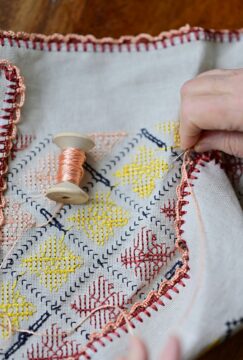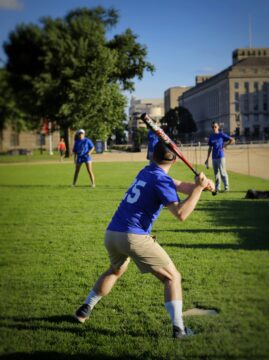by Rebecca Baumgartner

Several years ago, I trudged through a baking hot evening in July to go to my first-ever tennis lesson, offered by my city’s Parks and Rec department. Against a background of lightning bugs, cicadas, and a lingering heat despite the lateness of the hour, I started to learn the basics of tennis. In my mid-30s.
“Do you play racquetball?” the coach asked me after watching a few of my swings.
“Um, I used to, a long time ago.”
“I can tell. You’re swinging like you’re playing racquetball.”
As it turned out, I kept on playing tennis like it was racquetball, had a great time, but eventually decided tennis was not the sport for me (not that I’d been that great at racquetball, either). I finished up the last session and haven’t played tennis since. However, the experience was enjoyable and incontrovertibly worthwhile.
I’m a serial learner and hobbyist. Maybe you’d call it being a dilettante. Over the past 20-odd years, I’ve tried my hand at painting, pickleball, chess, printmaking, rock climbing, fencing, water aerobics, crochet, table tennis, cross-stitch, lacrosse, and the violin. I’ve auditioned for plays despite my complete lack of a theater background, sang in community choirs, joined an improv troupe, and competed in a darts tournament. I’ve dabbled in photography and tried to build fluency in German based on a shaky foundation laid in college. I’ve tried to get competent at the piano based on sporadic lessons I took 25 years ago, an effort that was hampered by not having access to a piano for approximately 23 of those years. When my kid played basketball, I learned the rules by hunching over my computer and squinting at YouTube videos of old NBA games, trying to figure out what foul a player had committed.
I’ve tried to understand how the brain works, how to read Old English, how to use HTML, and have made precisely one scrapbook. A random book on string theory and biographies of Mozart and Alan Turing expanded my understanding of topics I have no need to know. Most recently, I’ve read everything about Antarctica I can get my hands on, and am currently trying to learn as much as someone without a science degree can learn about radiation and nuclear power.
Despite the randomness of these activities, and my lack of competence in more than a small number of them, all of these various projects have been enjoyable for their own sake, and all of them have introduced me to a discipline or community of practice that was previously completely unfamiliar to me.

But in spite of the life-enhancing potential of pursuing random hobbies at the amateur level, “dabbling” has connotations of doing something for the wrong reasons – to keep up with a trend, for example, or as an escape from the responsibilities of real life. In this view, dabblers and dilettantes are weak of character; they don’t really know how to recognize the deeper pleasures of mastery and expertise. The phrase “jack of all trades, master of none” implies that someone lacks the discipline or focus to achieve more than a superficial grasp of a subject. On the other hand, the labels “Renaissance man” and “polymath” praise someone for seemingly the very same thing: the voraciousness of their interests.
Some sources state that the true definition of a polymath is someone with “formal acclaim in at least two apparently unrelated domains.” But I prefer to see the polymathic mind in terms of expansive and boundary-crossing curiosity rather than acclaim, which after all is a fickle thing. Many hesitate to define themselves as a polymath, protesting that they aren’t accomplished enough to deserve the label. Only the Newtons and Goethes of the world can call themselves polymaths. The term sounds formal and out-of-reach for most people – perhaps it’s that it’s Greek and sounds accordingly mythic, whereas the word dilettante sounds as affected and trite as the concept it describes.
We have these two different conceptions of what it means to be a person interested in many things, and whether someone is labeled a dilettante or a polymath seems to be not just a matter of objective achievement, but a matter of self-perception – and perhaps also privilege and status. I’ve noticed, for example, that women are rarely described as polymaths. The Wikipedia entry for the term lists only three women in its list of polymaths throughout all of human history: Hildegard of Bingen, Florence Nightingale, and Maya Angelou. Several additional female polymaths come to my mind (Jane Addams, Iris Murdoch, Sara Josephine Baker, Marie Curie, Ada Lovelace, and George Eliot, to name just a few) but these women’s accomplishments are usually condensed into a single primary area of focus, and they’re hardly ever referred to as polymaths, even by contemporary historians.
But being a “person of various learning,” under whatever label, doesn’t have to be an exclusive club filled with geniuses and luminaries. I’d like there to be a term somewhere between the olympian heights of polymath and the frivolity of dilettante, because I think this kind of intellectual exploration is within everyone’s grasp and that it’s one of the most valuable ways we have of giving our lives meaning and solving complex problems.

Unfortunately, the threat of being seen as superficial stops many of us from following up on all the various leads our curiosity suggests. The aphorism about someone “knowing enough to be dangerous” is a reminder that sometimes knowing a little bit about a subject leads you to overestimate your abilities and underestimate how complex the field really is. Someone with zero knowledge isn’t susceptible to this mistake and in that sense is not dangerous.
Ideally, we’d keep going with a subject far enough to realize just how complex it really is. Even though I never got anywhere near to proficient at the violin, I stuck with it long enough to have an inkling of how complex stringed instruments are and to appreciate all the many micro-skills, both cognitive and physical, required to make them produce a pleasant sound rather than a cat-being-tortured sound. Because of that experience, I can appreciate that what looks like simple back-and-forth bowing to a complete novice is actually a complex and intentional process of knowing when and how often to move the bow, what angle to hold it against the strings, how hard to press, etc.
When people stop an activity before reaching this humbling moment, that’s when their knowledge becomes “dangerous” in the sense of misleading them into feeling more competent than they are. This seems to be the crux of the charges of superficiality leveled against so-called dilettantes.
The way to avoid that is to simply keep at it until you respect the difficulties in play, even if you don’t understand them. If you decide to retreat at that point, you’ll at least have an appreciation of how much you don’t know. This is obviously not great in terms of an ego boost, but is a more accurate picture of what you’re up against. What we shouldn’t do is let our fear of appearing superficial suppress our curiosity before it even has a chance to take those first tentative steps.

Some of my interests have lasted a mere month or two, just long enough to learn some of the fundamentals and get a sense for what the big issues are. And even for the activities I’ve persisted with for years and with which I’m therefore a bit more familiar, I’ll often reach a plateau, fall back on lazy habits, and seem incapable of making real progress. Even when I do crawl forward, progress never seems linear; some of what I mastered last year has to be re-learned this year. Some activities hit a complete dead-end and fall by the wayside.
This willingness to weather the stagnant periods, accept the non-linear trajectory of growth, and even give up on something altogether, is completely opposed to the “streak” mentality that we’ve allowed to govern our relationships with hobbies and personal projects. We try to keep up our streaks on our step counters, language apps, and work-out games. There’s an overwhelming emphasis on building habits, creating a routine, and automating the performance of our leisure so that we don’t have to decide to do it – it simply becomes part of who we are. This is a good thing if it stops us from quitting prematurely, but the flip side is that it can make it harder for us to quit when we should and risks leaching the inherent fun out of the activity. Humans seem to have the perverse attribute that, as soon as we have to do something, we seem to enjoy doing it less – even if that mandate is self-imposed.
Stated more formally, we should be wary of letting our teleological hobbies turn into instrumental hobbies. This is not to say that an artist or crafter shouldn’t, for example, sell their wares on Etsy, or that we shouldn’t track our progress towards our goals. But as much as possible, I think we should resist letting our pet projects slip into the stream of gamification and monetization that already subsumes so much of our lives.
I realize this is perhaps the stance of a grumpy, middle-aged person, akin to laments about audiences recording concerts, sports games, and recitals on their phone rather than being present in the moment. If you want to transition a hobby from a teleological pursuit to an instrumental one, by all means go for it – but make it a conscious choice rather than letting your beloved pastime turn into just one more thing you have to do. Don’t rob yourself of the awe that your passions provide just because there exists a means of commodifying them.
In my personal experience, it seems that people would have more hobbies, or more variation in their hobbies, if they were less afraid of failing, less perfectionistic, or less dedicated to a particular conception of themselves. Being open to new experiences and believing you can get better at virtually anything with practice (the “openness to experience” personality trait and “growth mindset theory,” respectively) are helpful skills to have when embarking on a new hobby. Then again, perhaps it’s the act of trying many hobbies over time that helps one to develop a growth mindset and a greater openness to experience. However it’s framed, getting practice with cultivating the mind of a beginner over and over again is part and parcel of having multiple interests.

There’s no question that it can feel embarrassing and dispiriting to be the one struggling to draw a recognizable apple when the 19-year-old next to you is already giving their highly photorealistic apple dimensional shading. It can be demoralizing to listen to the flow of banter in a foreign language and not understand enough to get the joke that everyone’s laughing at. In a very real way, these types of experiences can remind you of the powerlessness and sense of being in the dark that most of us felt at some point in childhood.
But as understandable as these feelings are, they ultimately have their roots in vanity. Having a beginner’s mind requires us to set aside how we’d like to be seen and instead admit to a certain baseline of ignorance and inadequacy, at least for a time. Evidence shows that beginner’s mind (here called “intellectual humility”) is more of a context-dependent state than a stable trait. This means that no one is inherently better at having a beginner’s mind than anyone else; but it also implies that embracing our own ignorance is an ongoing task that we can never be done with. It’s simultaneously about taking one’s self less seriously than is typical, and taking one’s own personal development more seriously.
With this recognition comes freedom: You can spend as much or as little time on any given aspect of a project as you want. No one is grading you. For example, I love playing the piano, but getting all the fingerings technically correct in every baroque piece isn’t something I want to spend my time on. A teacher or professional would certainly make me spend more time on this skill if I were following a curriculum. But part of enjoying being an amateur over the long haul is knowing what you need to do (or not do) to keep the activity fun for you. As soon as it stops being fun, then there truly is no point.

Of course, the downside to crafting your own personal curriculum is that you’ll inevitably end up with some gaps and weaknesses. My technique in Bach pieces is often non-standard and inefficient. But my goal is to enjoy the challenge of learning a piece of music, not to become a “real” pianist. Excelling is not the point, and no one is keeping score.
Accepting the reality of one’s mediocrity in most areas of human endeavor and choosing to dabble in them anyway is a way of recouping some of the opportunity costs exacted by our specialist-obsessed world. Many adults, even long after leaving school, will continue to define themselves by their long-ago college major or continue to make self-limiting statements like “I’m no good at art,” which likely haven’t been re-evaluated in decades or might only be an assumption based on no data whatsoever. Not only does dabbling teach you more about the world in a low-risk way, it also allows you to update your self-conception for the present day and toss out old narratives.
Even if a re-definition of self isn’t what you’re after, there’s ample evidence that pursuing leisure activities is good for mind, body, and relationships. Multiple scientific studies have shown that being engaged in hobbies directly impacts our wellbeing by helping us prevent or manage mental illness, cognitive decline, and dementia, as well as playing a protective role against age-related physical decline and chronic disease. How exactly this occurs is an open area of research. One meta-analysis from 2021 identified over 600 psychological, biological, and social factors that have been theorized or proven to interact to produce these health outcomes. Among these 600 mechanisms are biological factors such as reduced pain, improved management of addiction, improved sleep, increased gray matter, decreased cellular aging, decreased bacterial and viral infections, in addition to psychological factors such as increased self-efficacy, decreased self-sabotaging beliefs, and improved tolerance of uncertainty.

Pursuing hobbies can also feed scientific creativity and problem-solving. One study found that “the more artistic hobbies a scientist engaged in as an adult, the greater their probability of achieving eminence within science.” The researchers found that those who had won a Nobel prize were many times more likely than “average” scientists to write poetry, practice the visual arts, or play an instrument. In fact, whether someone had artistic hobbies or not turned out to be a better predictor of reaching the upper echelons of science than the person’s IQ. Of course, as the authors of the study acknowledge, this doesn’t tell us which way the arrow of causality goes. In other words, does having a lot of hobbies create the conditions for scientific genius, or do scientific geniuses simply tend to have more hobbies?
At the very least, however, everyone can benefit from adding more variety to their mental landscape. If your goal is to come up with new ideas and reach creative solutions that haven’t been found yet, deliberately shifting your focus to something else for a while is far more effective than doubling down on the problem. Varied pursuits and diverse interests help us avoid this kind of “cognitive fixation.”
Despite all of the foregoing reasons for dedicating oneself to a wide range of disparate interests and hobbies, life – and ego – so often seems to get in the way. I would hazard a guess that, aside from psychological factors like a fear of failure, the number one reason why more people don’t have more hobbies is a self-reported “lack of time.” I think when people say this they are actually trying to communicate “I don’t have the mental energy for this.”
The people who say they don’t have time for meaningful hobbies like reading or playing an instrument seem to spend as much time as anyone else staring at trivial things on their phone. It’d be very strange indeed to hear someone say “I don’t have time to mess around on my phone.” The difference is not one of time but of mental energy. It is completely plausible that someone might technically have the time for a challenging hobby, but not have the mental energy to do more than swipe through their phone, and I am sympathetic to this more precise and more accurate formulation of the excuse.

So, given that the true enemy is not time but energy, I would respond by saying: Hobbies take energy, yes, but they also give it – in fact, they usually give back more than they consume. A creative pursuit, while it may require concentration and effort, can also replenish your existential stamina, your give-a-damn, or whatever you call your ability to get out of bed each day and keep going. It’s a tonic against ennui, a chew toy for your brain, an engrossing puzzle, a conversation piece, and a source of momentum that provides its own fuel and its own ratchet effect. Having a dead-end job or being depressed or having a chronic illness or going through grief or any number of other circumstances that would seem to preclude the development of a hobby are in fact the very circumstances in which the benefits of meaningful hobbies are most profound.
We may not have a good term in English that captures the roving curiosity and intellectual humility that lives somewhere between polymath and dilettante, but in the meantime it’s interesting to know that the term dilettante originally had a positive connotation. It comes from Latin delectare “to delight” and was used to mean “one who delights in knowledge.” In this non-pejorative sense, being a dilettante is about pleasure derived from abundance. It’s the opposite of being a picky eater when it comes to the intellectual buffet; it’s someone who embraces the variety, enormity, and interconnectedness of different forms of knowledge and tries to at least gain a passing familiarity with their riches. Being an expert in everything would be wonderful, but sadly, it’s not for mortals. Dabbling, when you get right down to it, is the most that any of us can do.
Enjoying the content on 3QD? Help keep us going by donating now.
